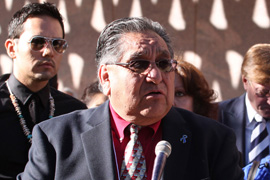Cronkite News has moved to a new home at cronkitenews.azpbs.org. Use this site to search archives from 2011 to May 2015. You can search the new site for current stories.
Hopi criminal code overhaul could ‘open the door’ to lower crime, fewer social ills
WASHINGTON – After years of watching the drug dealers and the bootleggers work in her community with little recourse, Hopi activist Samantha Honani has a new message for them.
“I hope they’re scared right now,” Honani said.
Scared because her tribe is one of the first in the nation to take advantage of a new federal law that lets tribal courts triple the penalties they can hand down in criminal cases. The change gives tribal officials the authority to prosecute felonies for the first time in decades.
The Hopi have taken it a step further, completely overhauling the Hopi Code of Laws to address a range of social ills on the reservation that some feel festered because weak laws had stymied efforts to deal with them.
“I am so very proud of our people. It took a lot of strength to stand up and talk about this stuff,” said Hopi Tribal Council Chairman LeRoy Shingoitewa.
The council’s Aug. 28 vote to revamp the code followed more than a year of public meetings that included often heart-wrenching testimony from people who said they had been victims of crime – from domestic violence to drugs to sexual assault – and their families.
Wayne Kuwanhyoima, a council representative from the village of Moenkopi, chaired the task force that worked for 14 months to draft the code changes and get them through the council.
“We had accomplished something that should have been accomplished way back,” Kuwanhyoima said.
The changes came under the Tribal Law and Order Act of 2010, a federal law aimed at improving public safety in Indian Country by granting extra law enforcement powers to tribes that meet certain requirements.
Previously, tribal courts could only hand out sentences of up to one year in jail and up to $5,000 in fines, even in the case of violent crime. Otherwise, cases had to be turned over to federal authorities.
The new law allows tribal courts to impose sentences up to three years per offense – with a maximum stacked sentence of nine years – and charge up to $15,000 in fines.
The updated Hopi Code, which takes effect Sept. 28, includes a list of felonies for the first time since Congress passed the Indian Civil Rights Act of 1968, which limited the sentencing powers of tribal courts.
The Hopi are among the first of the 566 federally recognized American Indian tribes take advantage of the new law. But the degree of changes the tribe has made to its code is significant, said Assistant U.S. Attorney John Tuchi, the tribal liaison for the U.S. Attorney’s Office in Arizona.
“They didn’t just make the changes they needed to get the felony authority. They went through the entire code,” Tuchi said.
Notable changes include an expansion of actions that can be prosecuted as sexual assault. The tribe also updated its narcotics laws to include drugs that have been spreading through tribal communities in and out of Arizona in recent years, such as methamphetamine.
Kuwanhyoima, a former Marine who worked in law enforcement for about 30 years, said he believes the changes will help heal his community.
“This Hopi Code will open the door for the people that have been victimized by different crimes, especially young women,” Kuwanhyoima said.
Native Americans experience violent crime at a rate more than twice the estimated national rate, according to a 2011 report from the Government Accountability Office.
“In the mainstream world the crimes that we are talking about are regularly sentenced for longer terms,” said John Dossett, general counsel for the National Congress of American Indians, which helped draft the Tribal Law and Order Act.
Dossett said the act is a good first step, but more needs to be done. One step, which his group is focused on, is pushing for early intervention instead of just dealing with the fallout from serious crime.
Tuchi said substance abuse is fueling much of the serious crime on the reservation, with drugs like meth and oxycodone “all over the place.”
“Almost without exception all the violent crime … on the res has a correlation with substance abuse,” he said.
Honani has experienced substance abuse problems in her own family, and said she used to get frustrated that little could be done to stop the dealers.
“We always wanted to blame the police. That was our first, initial reaction,” she said. “We found out that there was so much more to that.”
It’s still a little hard for her to believe that the change is finally here. Honani said when she and other community activists met for lunch last week, they were all “just in awe” of what they had accomplished.
She said she hopes their efforts to “strengthen our laws and our ordinances out here on Hopi” lands can inspire people in other tribes to work on similar measures.
“May it be a driving force to strengthen all our system that can help our people,” she said.







